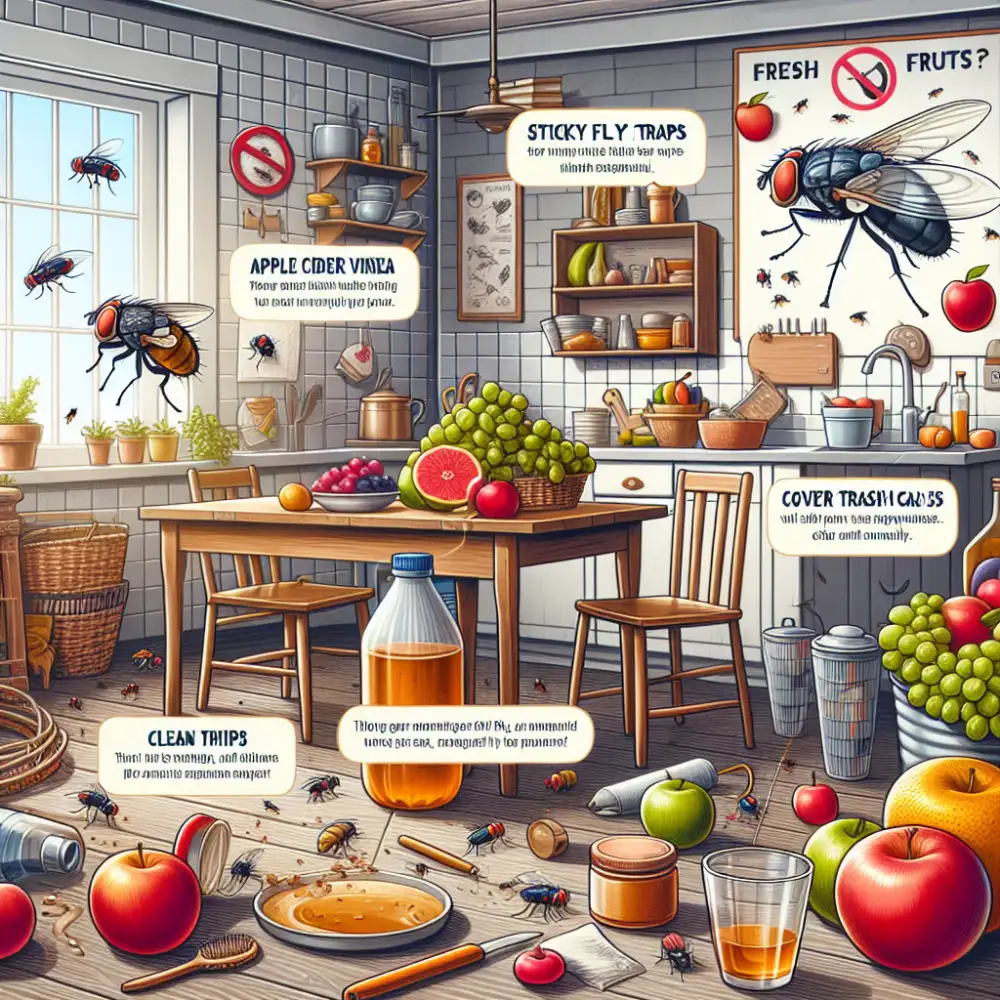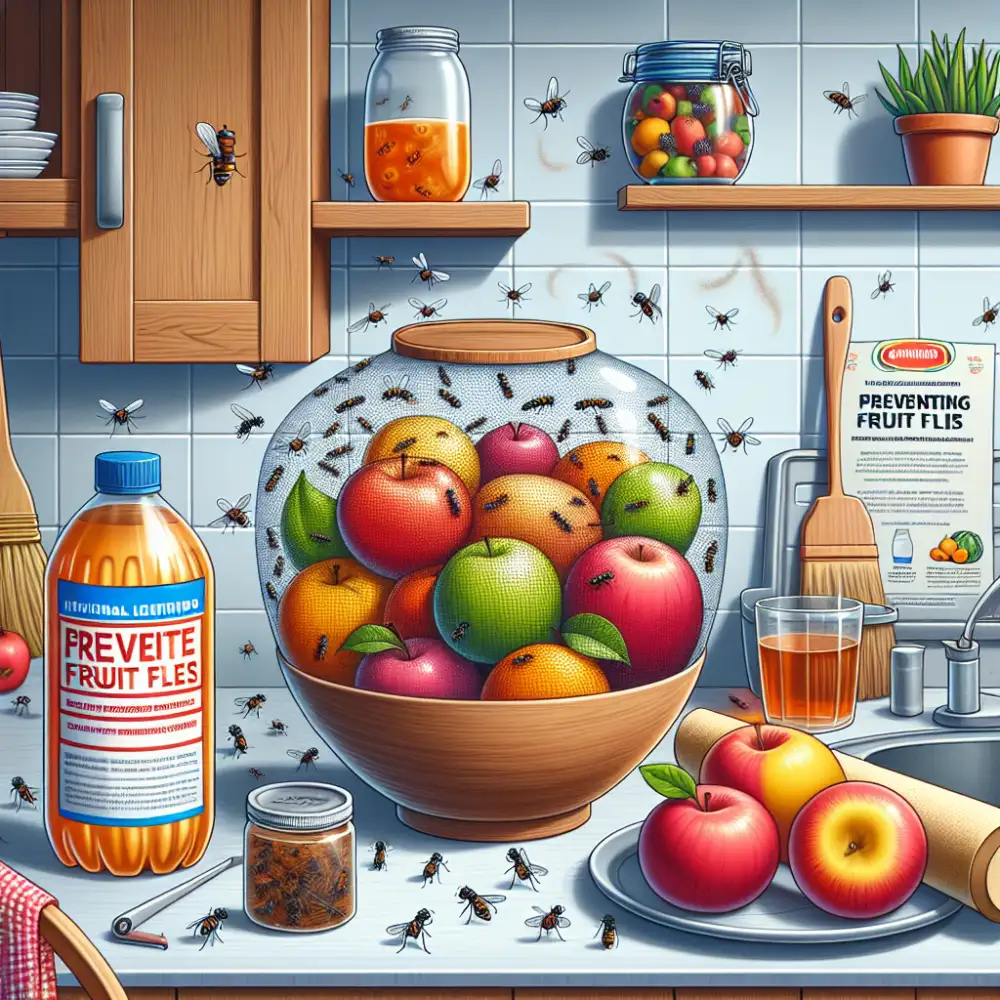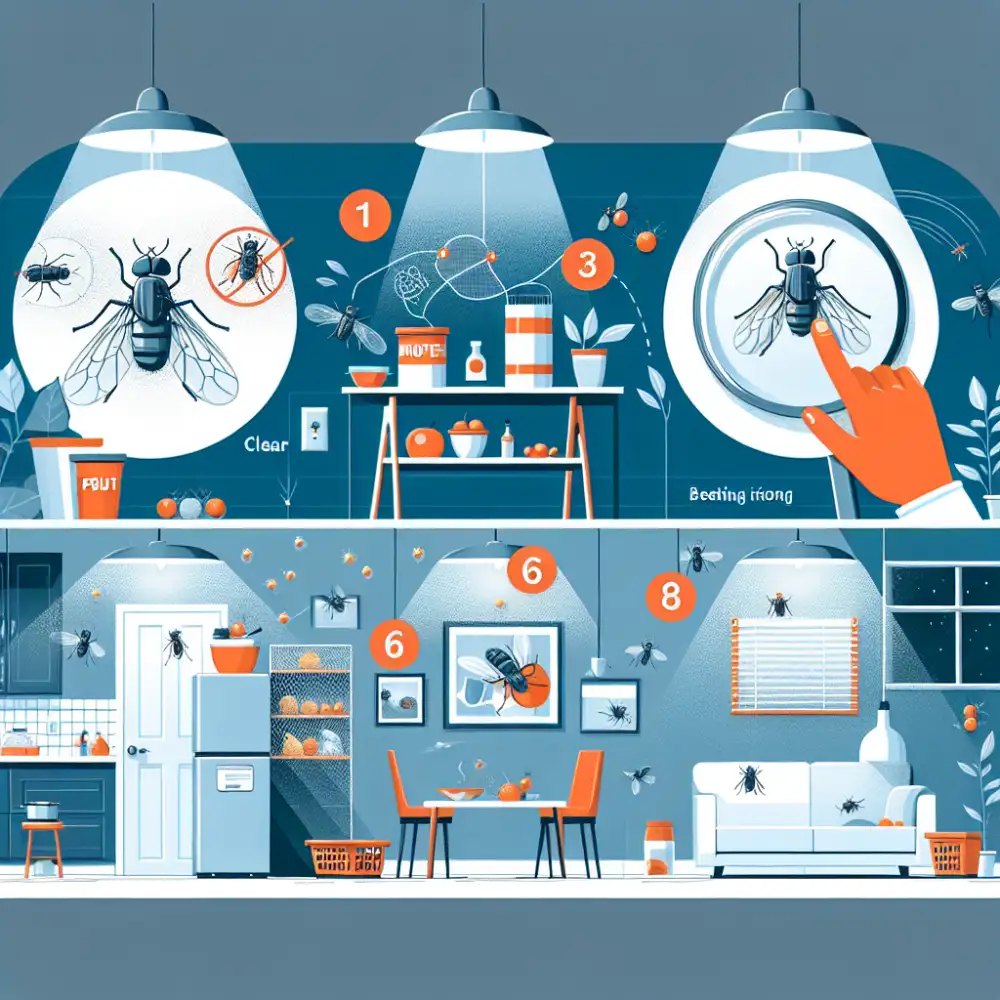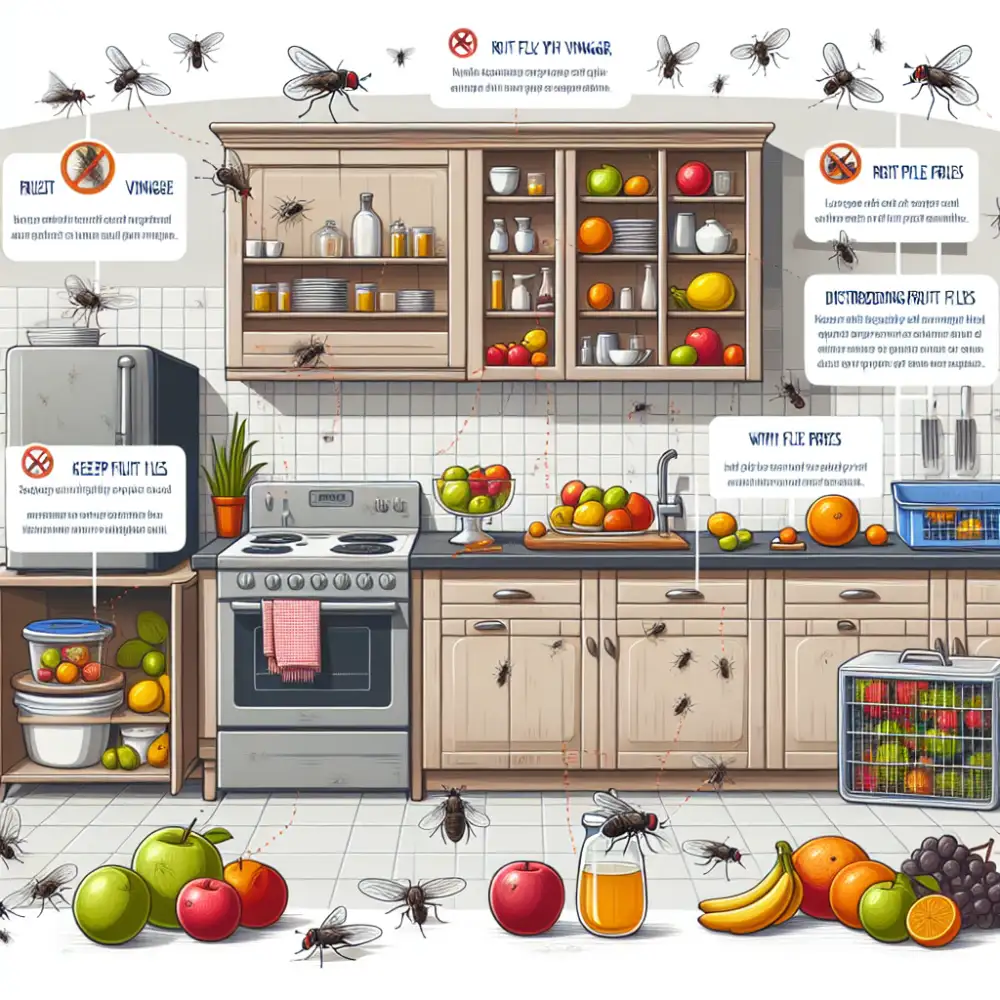Banish Pesky Fruit Flies: Effective Tips for a Fly-Free Home

Identify Breeding Spots
Fruit flies are masters at finding even the smallest bits of fermenting fruits and vegetables. They are also attracted to moist areas where organic material is present. Check your kitchen thoroughly for potential breeding grounds:
- Overripe or rotting fruits and vegetables: Store them in the refrigerator or properly dispose of them.
- Dirty dishes: Wash dishes promptly, especially those that have come into contact with sugary or alcoholic substances.
- Trash cans: Empty trash cans regularly and make sure they are tightly sealed.
- Recycling bins: Rinse out cans and bottles before discarding them in the recycling bin.
- Drains: Fruit flies often breed in the slime that builds up inside drains. Flush drains with boiling water or a solution of baking soda and vinegar to eliminate breeding sites.
- Spills and crumbs: Wipe up spills immediately and clean up crumbs regularly.
- Pet food: Store pet food in airtight containers and clean up any spills promptly.
- Moist areas: Check under sinks, around appliances, and in other damp areas for signs of fruit flies.
- Potted plants: Overwatering can create a breeding ground for fruit flies in the soil. Allow the soil to dry out between waterings and consider using a natural insecticide like neem oil.
By identifying and eliminating these breeding spots, you'll significantly reduce the fruit fly population in your home and prevent future infestations.
Eliminate Food Sources
Fruit flies are masters at sniffing out even the smallest piece of overripe fruit or a forgotten drop of juice. The first step in getting rid of them is to eliminate their food sources. Start with your countertops and any areas where you prepare food. Wipe them down thoroughly with a hot, soapy sponge. Don't forget about less obvious spots like under appliances, inside microwaves, and even the garbage disposal. Next, tackle your fruit bowl. Remove any overripe or bruised fruits and vegetables and store the rest in the refrigerator or in airtight containers. Fruit flies can also breed in drains. Pour boiling water down the drain to eliminate any lingering food particles or eggs. If you compost, make sure your compost bin is tightly sealed and stored away from your house. Remember, even a tiny amount of food can attract and sustain fruit flies, so be vigilant in your cleaning efforts.
Clean Thoroughly
The first step to kicking these pesky critters to the curb is a thorough cleaning, especially in your kitchen. Fruit flies are drawn to sugary, fermenting substances. They lay their eggs near these food sources, so sanitation is key. Start by cleaning up any spills or crumbs on your countertops, floors, and inside cabinets. Don't forget less obvious spots like under appliances and the garbage disposal. Toss out any overripe or rotting fruits and vegetables. Store the rest in the refrigerator or in airtight containers. Wipe down surfaces where you've seen fruit flies with a mixture of hot water and vinegar. Empty your trash regularly, especially if it contains food scraps. Consider using a trash can with a lid. A clean kitchen is a less inviting environment for fruit flies.

Use Traps
Fruit flies are experts at finding overripe or rotting produce. Once they’ve moved in, it can feel impossible to get rid of them. Trapping is a very effective way to eliminate fruit flies, especially when combined with other preventative measures. You can purchase ready-made traps, but it’s easy and inexpensive to make your own. One popular method is the apple cider vinegar trap. Simply pour a small amount of apple cider vinegar into a jar or bowl. Add a few drops of dish soap, which breaks the surface tension of the vinegar and prevents flies from escaping. Cover the top of the jar with plastic wrap and secure it with a rubber band. Poke several small holes in the plastic wrap. The sweet scent of the vinegar will attract the flies, and they’ll fly in through the holes but won’t be able to find their way back out. Another effective trap uses a paper cone placed in a jar with a mixture of overripe fruit and a little bit of water. The flies are attracted to the fermenting fruit and fly into the jar, but they can’t navigate back out through the narrow opening of the cone. Remember to empty and clean your traps regularly, and replace the bait every few days to keep them effective.
Apple Cider Vinegar Trap
Apple cider vinegar traps are a classic method for a reason: they work! The sweet scent of the vinegar attracts the fruit flies, while the sticky liquid traps them, preventing their escape. Here’s how to make one:
Dish Soap Trap
A simple dish soap trap can work wonders in catching and eliminating these pesky insects. Mix a small amount of dish soap with apple cider vinegar or red wine in a bowl. Fruit flies are drawn to the sweet scent of the vinegar or wine, while the soap breaks the surface tension of the liquid, causing them to drown. Place the bowl near areas where you notice fruit fly activity and watch as it effectively traps and eliminates them. For optimal results, consider covering the bowl with plastic wrap and poking small holes in it. This allows the aroma to escape and attract fruit flies while preventing them from escaping once they've landed in the solution.
Store Produce Properly
One of the best ways to prevent fruit flies from taking over your kitchen is to eliminate their food source: overripe or rotting produce. Store fruits and vegetables properly to make them less appealing to these pesky insects. Store ripe fruits and vegetables like bananas, tomatoes, and avocados in the refrigerator. The cool temperature will slow down the ripening process and make them less attractive to fruit flies. Keep produce that doesn't need to be refrigerated, such as onions, potatoes, and garlic, in a cool, dry, and well-ventilated area. Avoid storing produce in airtight containers, as this can trap moisture and speed up the ripening process. Instead, use breathable containers like mesh bags or baskets. Regularly check your stored produce and discard any overripe or rotting items immediately. By taking these simple steps, you can significantly reduce the likelihood of fruit flies finding a welcoming environment in your kitchen.

Take Out Trash Regularly
One of the simplest yet most effective ways to prevent and eliminate fruit flies is taking out your trash regularly. Fruit flies breed and multiply rapidly in decaying organic matter, and your trash can is like an all-you-can-eat buffet for them. Don't wait until the trash is overflowing. Empty it every day or two, especially if it contains food scraps, fruit peels, or other organic waste. Use a trash can with a tight-fitting lid to keep the flies out and the smell contained. If you have a garbage disposal, make sure to clean it regularly to remove any lingering food particles that might attract these pesky insects. Remember, a clean trash can is a less inviting environment for fruit flies.
Maintain Clean Drains
Fruit flies are masters at sniffing out even the tiniest bit of fermenting organic material. And guess where they love to lay their eggs? You got it – inside your drains! Over time, drains accumulate gunk, made up of food scraps, grease, and other organic debris. This creates a perfect breeding ground for fruit flies. To evict these unwelcome guests, make drain cleaning a regular habit.
Pouring boiling water down the drain once a week is a good start. You can also flush your drains with a solution of baking soda and vinegar. Let the mixture fizz for about 30 minutes before flushing with hot water. For a deeper clean, use a drain brush to scrub away any lingering grime. Remember, a clean drain is less inviting to fruit flies.
Dry Excess Moisture
Fruit flies thrive in moist environments. They lay their eggs in fermenting organic matter, and excess moisture provides the perfect breeding ground. Take a proactive approach to moisture control to make your home less appealing to these pesky insects. Wipe down surfaces immediately after spills, especially sugary liquids. Don't leave damp sponges or dishcloths sitting out. Ensure your sink drains are clear and free of food debris. If you have houseplants, avoid overwatering them, as the damp soil can attract fruit flies. Empty and clean drip trays under your plants regularly. Consider using a dehumidifier in areas prone to dampness, such as basements or bathrooms. By addressing excess moisture, you'll create a less hospitable environment for fruit flies and make it harder for them to multiply.


Natural Repellents
Fruit flies have a keen sense of smell and are particularly attracted to the fermenting scents of ripe or decaying fruits and vegetables. Thankfully, several natural ingredients can help deter these pesky insects. Basil, known for its culinary uses, doubles as a natural fruit fly repellent. Place a pot of basil near your fruit bowl or in areas where fruit flies congregate. The aroma disrupts their ability to locate food sources, driving them away. Lavender, with its soothing fragrance, is another excellent choice. Place dried lavender sachets near fruit baskets or create a lavender-infused spray by steeping dried lavender in water and misting the affected areas. Cloves, commonly used in baking, possess a strong aroma that fruit flies find unpleasant. Stud a few oranges or lemons with cloves and place them strategically around your kitchen. The combination of citrus and clove scents will deter these insects. Mint is another herb with a refreshing scent that fruit flies find offensive. Plant mint in pots and place them near entry points or areas prone to fruit fly infestations. Alternatively, crush fresh mint leaves and scatter them around problem areas to repel these pests. Remember to discard overripe or rotting fruits and vegetables promptly and keep your kitchen counters and sinks clean and free of food debris. Combining these natural repellents with diligent sanitation practices will significantly reduce fruit fly populations in your home.
The best offense is a good defense. Keep counters and sinks clean and free of food debris, store fruit in the refrigerator, and take out the trash regularly.
Elowen Peabody
Professional Pest Control
If you're dealing with a persistent fruit fly infestation, it might be time to call in the pros. Professional pest control services have the expertise and tools to tackle even the most stubborn infestations. Here's what you can expect:
Inspection: A licensed pest control technician will visit your home to identify the source of the infestation and assess the severity. They'll look for breeding sites, entry points, and any factors contributing to the problem.

Treatment: Treatment methods vary depending on the severity of the infestation and the specific pest control company. Common approaches include:
Insecticides: Professionals have access to commercial-grade insecticides that are more potent and effective than those available to the public. They'll apply these treatments strategically to target fruit flies at all stages of their life cycle.
Traps and Baits: Pest control companies may use professional-grade traps and baits to capture and eliminate adult fruit flies. These traps often contain pheromones or other attractants that are highly effective in luring and trapping flies.
Exclusion Methods: Professionals can identify and seal potential entry points, such as cracks in walls, gaps around windows and doors, and vents, to prevent future infestations.
Prevention: A crucial aspect of professional pest control is prevention. The technician will provide you with valuable advice and recommendations on how to prevent future fruit fly infestations. This may include tips on proper food storage, sanitation practices, and ways to eliminate breeding sites.
Calling in professional pest control offers several benefits:
Expertise: Pest control professionals have extensive knowledge of fruit fly behavior, biology, and effective control methods.
Safety: Professionals use insecticides and treatments safely and responsibly, minimizing risks to your family and pets.
Long-Term Solutions: Professional treatments are designed to eliminate existing infestations and prevent future ones.
Peace of Mind: Knowing that experts are handling the problem can provide peace of mind and allow you to enjoy a pest-free home.
Published: 12. 07. 2024
Category: Food



